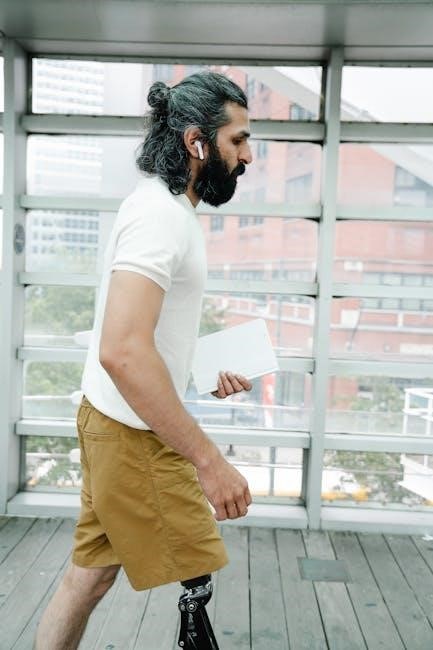Homophobia, often rooted in societal prejudice, leads to profound emotional distress, self-hatred, and mental health challenges for LGBTQ+ individuals, hindering their ability to embrace their authentic selves.
Defining Homophobia and Its Effects on Mental Health
Homophobia refers to prejudice, discrimination, or hostility toward individuals based on their sexual orientation or gender identity. It manifests as external oppression or internalized self-hatred, deeply affecting mental well-being. The stress of societal rejection can lead to anxiety, depression, and low self-esteem. Many experience emotional turmoil, feeling ashamed of their identity due to pervasive homophobic attitudes. Internalized homophobia, in particular, fosters self-loathing and isolation, hindering personal growth and relationships. Addressing these mental health challenges requires understanding the roots of homophobia and fostering acceptance, both within oneself and society.
The Prevalence of Internalized Homophobia in LGBTQ+ Communities
Internalized homophobia is widespread among LGBTQ+ individuals, often stemming from societal stigma, family rejection, and cultural norms. Many struggle with self-acceptance, fearing judgment and rejection, which leads to feelings of inadequacy and self-loathing. This internal conflict can result in mental health issues like depression and anxiety, as well as difficulty forming healthy relationships. The prevalence is higher in environments where homophobic attitudes dominate, making it a significant barrier to self-acceptance and emotional well-being. Recognizing these patterns is crucial for healing and fostering resilience within the community.
Understanding the Roots of Shame and Self-Hatred
Societal norms, discrimination, and negative experiences contribute to deep-seated shame and self-hatred, often internalized as feelings of worthlessness, further exacerbated by cultural and personal trauma.
Societal and Cultural Influences on Homophobic Attitudes
Societal and cultural norms often perpetuate homophobic attitudes, fostering an environment of prejudice and discrimination. Media representation, educational systems, and institutional policies frequently reflect biased views, marginalizing LGBTQ+ individuals. Cultural traditions and religious teachings may reinforce negative stereotypes, contributing to widespread homophobia. These external factors internalize shame and self-hatred, making it difficult for individuals to embrace their identities. Addressing these influences requires challenging systemic discrimination and promoting inclusive, accepting environments that celebrate diversity and human rights. By dismantling harmful societal structures, we can create a more compassionate world for LGBTQ+ communities to thrive.
The Role of Family and Upbringing in Shaping Self-Perception
Family dynamics and upbringing significantly influence self-perception, particularly for individuals grappling with homophobia. Rejection or disapproval from family members can deepen feelings of shame and self-hatred, often leading to internalized homophobia. Growing up in environments where heteronormative values are strongly emphasized can make LGBTQ+ individuals feel abnormal or unworthy. This can result in a lifelong struggle to reconcile their authentic selves with societal expectations, fostering low self-esteem and emotional distress. The absence of acceptance at home can hinder personal growth, making it challenging to embrace one’s identity and find self-compassion in a world that often feels hostile.
Religious and Moral Teachings That Contribute to Homophobia
Religious and moral teachings often play a significant role in perpetuating homophobia, as certain interpretations of sacred texts are used to condemn same-sex relationships. These teachings can instill deep-seated guilt and shame in LGBTQ+ individuals, leading to internalized homophobia. The belief that being LGBTQ+ is morally wrong can foster self-hatred and a disconnection from one’s true identity. Such ideologies, reinforced by religious communities, create an environment where acceptance is withheld, further isolating individuals and exacerbating mental health struggles. The clash between personal identity and religious doctrine can be particularly damaging, making self-acceptance a challenging journey.

Coping Strategies for Overcoming Homophobia-Related Shame
Effective techniques include mindfulness, self-acceptance, and seeking support to address internalized homophobia, fostering healing and empowerment.
Mindfulness and Self-Acceptance Practices
Mindfulness practices, such as meditation and deep breathing, help individuals stay present and reduce anxiety. Self-acceptance involves embracing one’s identity without judgment, fostering self-compassion. These techniques counteract internalized homophobia by encouraging kindness toward oneself and challenging harmful beliefs. Regular reflection and affirmations can redefine self-perception, promoting emotional healing and resilience. By integrating mindfulness into daily life, individuals can cultivate a positive relationship with themselves, diminishing shame and fostering authenticity. These practices empower LGBTQ+ individuals to reclaim their identity and live freely, unburdened by societal expectations or self-hatred.
Journaling and Expressing Emotions as a Healing Tool
Journaling is a powerful method for processing emotions and healing from internalized homophobia. By writing down feelings, individuals can gain clarity, release pent-up emotions, and confront painful experiences. This practice allows for self-reflection and understanding, helping to identify patterns of negative self-talk. Over time, journaling can foster self-compassion and empower individuals to reframe their self-perception. It provides a safe space to explore identity and gradually diminish shame. Regularly expressing emotions on paper can lead to emotional release, personal growth, and resilience, making it an accessible and effective tool for healing and self-liberation.
Building a Support Network of Allies and Peers
Surrounding yourself with a supportive network of allies and peers is crucial in overcoming homophobia-related shame. A strong support system provides emotional validation, understanding, and encouragement, helping to counteract feelings of isolation. Connecting with others who share similar experiences fosters a sense of belonging and reduces stigma. Allies can offer unconditional acceptance, while peers can provide relatable insights and shared strength. Actively engaging with LGBTQ+ communities or support groups, either online or in person, can empower individuals to embrace their identity. Building such a network creates a safe space for healing, empowerment, and mutual growth, aiding in the journey toward self-acceptance and resilience.

The Role of Therapy in Addressing Internalized Homophobia
Therapy helps individuals break free from internalized homophobia by offering tools for self-reflection, fostering resilience, and promoting a journey toward self-acceptance and emotional well-being.
Cognitive Behavioral Therapy (CBT) for Homophobic Thought Patterns
Cognitive Behavioral Therapy (CBT) is a highly effective approach for addressing internalized homophobia. By identifying and challenging negative thought patterns, individuals can reframe harmful beliefs rooted in societal prejudice. CBT helps individuals recognize how homophobic messages may have been internalized and how these thoughts contribute to self-hatred. Through structured exercises, individuals learn to question the validity of these beliefs and replace them with more compassionate, affirming perspectives. This process, guided by a trained therapist, fosters self-awareness and emotional resilience. Over time, CBT can significantly reduce feelings of shame and promote a more positive self-image, leading to improved mental health and well-being.
Group Therapy and Shared Experiences as a Path to Healing
Group therapy offers a safe space for individuals to share their experiences with others who face similar struggles with internalized homophobia. This collective environment fosters connection and reduces feelings of isolation. By hearing others’ stories, participants often find validation and relief, realizing they are not alone in their journey. Group therapy encourages open dialogue, allowing individuals to process shame and self-hatred together. The shared experience of healing can deepen empathy and understanding, while the guidance of a trained therapist ensures meaningful progress. This collaborative approach empowers individuals to rebuild their sense of self-worth and embrace their authenticity with the support of others who truly understand their challenges.

Embracing Self-Compassion and Self-Love
Self-compassion and self-love are essential for healing from internalized homophobia. By practicing kindness toward oneself and embracing personal identity, individuals can cultivate a positive self-image and alleviate shame.
Practicing Self-Care and Celebrating Personal Identity
Engaging in self-care practices, such as meditation, journaling, or creative expression, helps individuals reconnect with their authentic selves. Celebrating personal identity involves embracing uniqueness and rejecting harmful societal norms. By fostering self-worth and resilience, self-care becomes a powerful tool against internalized homophobia. It encourages individuals to honor their experiences and passions, promoting a healthier relationship with themselves. Consistent self-care rituals can empower LGBTQ+ individuals to thrive, expressing their true selves without apology. This mindset shifts focus from shame to pride, fostering a life of authenticity and freedom.
Challenging Negative Self-Talk and Rebuilding Self-Esteem
Addressing negative self-talk involves recognizing and reframing harmful internalized messages rooted in homophobia. Techniques like cognitive restructuring can help replace self-critical thoughts with affirming ones. Building self-esteem requires acknowledging strengths and accomplishments, fostering self-worth. Surrounding oneself with supportive, affirming individuals can counteract negative self-perceptions. Celebrating personal achievements, no matter how small, reinforces a positive self-image. Over time, these practices help dismantle internalized shame, allowing individuals to embrace their true selves with confidence and resilience, ultimately fostering a healthier and more compassionate relationship with oneself.
Using Affirmations to Counteract Internalized Homophobia
Affirmations are powerful tools to combat internalized homophobia by replacing harmful self-talk with positive, empowering statements. Daily repetition of phrases like “I am worthy of love and respect” or “I proudly embrace my true self” helps rewire the brain to cultivate self-acceptance. These affirmations challenge deeply ingrained negative beliefs, fostering a more compassionate and loving relationship with oneself. Consistency is key, as this practice gradually diminishes the impact of homophobic conditioning. Over time, affirmations can help individuals reclaim their identity with confidence and pride, serving as a cornerstone for healing and self-love.

Advocating for Societal Change
Advocating for societal change involves challenging homophobic stereotypes, promoting inclusivity, and supporting policies that protect LGBTQ+ rights, fostering a culture of acceptance and equality for all.
Educating Others About Homophobia and Its Consequences
Educating others about homophobia involves sharing accurate information on its harmful effects, promoting empathy, and encouraging open dialogue. This fosters understanding and reduces prejudice. By highlighting real-life stories and data, individuals can grasp the emotional toll of homophobia, such as mental health struggles and social isolation. Education also empowers allies to support LGBTQ+ communities effectively, creating a more inclusive environment. Through workshops, media, and personal conversations, awareness campaigns can dismantle stereotypes and promote acceptance, leading to a more compassionate society where diversity is valued and respected.
Engaging in Activism to Promote LGBTQ+ Rights
Activism plays a vital role in combating homophobia and advancing LGBTQ+ rights. Through participation in protests, Pride events, and advocacy campaigns, individuals can challenge discriminatory norms and promote inclusivity. Supporting LGBTQ+-inclusive policies and legislation is essential for fostering equality. Grassroots organizing and awareness initiatives empower communities to address homophobia collectively. By advocating for change and educating others, activists help dismantle systemic biases and create a more accepting society. Engaging in activism not only drives societal progress but also strengthens solidarity among LGBTQ+ individuals and allies, paving the way for a future free from shame and discrimination.
Overcoming homophobia requires embracing authenticity, fostering self-compassion, and building supportive communities. Collective healing and advocacy pave the way for a future free from shame and discrimination.
Embracing a Life of Authenticity and Freedom
Embracing authenticity allows individuals to break free from the shackles of internalized homophobia, fostering self-acceptance and empowerment. Living authentically means aligning actions and identity with true self, promoting mental well-being and resilience. Freedom from societal expectations enables individuals to express their sexuality and gender without fear, leading to a more fulfilling and purposeful life. This journey involves self-compassion, challenging negative narratives, and surrounding oneself with supportive communities. Authenticity is key to healing, growth, and living a life free from shame, where one’s true self is celebrated and valued.
The Importance of Community and Collective Healing
Community plays a vital role in healing from homophobia-related trauma, offering a safe space for shared experiences and mutual support. Connecting with others who understand the struggles of shame and self-hatred fosters empathy and validation. Collective healing through support groups or inclusive spaces helps individuals rebuild their sense of belonging and identity. Together, communities can challenge oppressive norms and advocate for acceptance, creating a nurturing environment for growth.Unity and solidarity empower individuals to embrace their authenticity, while celebrating diversity and promoting inclusivity. Collective healing not only strengthens personal resilience but also fosters a culture of love, acceptance, and empowerment.
